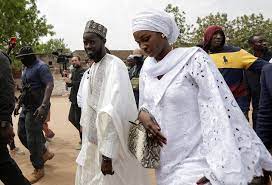Diomaye Faye has officially been declared winner of the presidential election in Senegal, winning 54.28% of votes in the first round after conclusion of votes in the country.
According to the country’s vote counting commission, which falls under the judiciary, Faye finished well ahead of the governing coalition’s candidate, former prime minister Amadou Ba, who had 35.79% of the votes.
It would be recalled that Faye was freed from prison 10 days before the election, still has to be validated by Senegal’s top constitutional body, which could happen in a few days.
Faye, 44, who has said he wants a “break” with the current political system, is set to become the youngest president in Senegal’s history.
Faye’s victory at tthe polls was the first time since independence from France in 1960 that an opponent has won in the first round
Aliou Mamadou Dia, who came third out of 19 candidates officially on the list, won just 2.8 percent of the vote, according to figures read out at the Dakar court by the president of the national vote counting commission, Amady Diouf.
While his victory in Sunday’s vote was already clear after the publication of unofficial partial results, the margin of Faye’s win was confirmed by the vote counting commission, which falls under the judiciary.
The turnout of 61.30 percent was less than in 2019 when outgoing President Macky Sall won a second term in the first-round, but more than in 2012.
The announcement of the official provisional results seems to clear the way for a handover of power between Sall and his successor.
The political crisis triggered by Sall’s last-minute postponement of the vote, and the subsequently rushed electoral timetable, cast doubt on whether the handover could take place before the incumbent’s term officially ends on April 2.
But a swift handover now seems feasible in the West African nation, which prides itself on its stability and democratic principles in a coup-hit region, provided no appeals are made.
Presidential candidates have 72 hours after the results are announced by the commission to lodge an appeal with the Constitutional Council.
The Constitution states that if no appeals are made in this period, “the Council shall immediately proclaim the final results of the ballot”.
But if an objection is made, the Council has five days to rule and could, in theory, annul the election.









